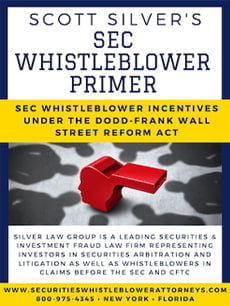Whistleblower Reporting for Securities Fraud
Every year bad actors defraud thousands of US investors. An important source of protection against this fraud is the participation of whistleblowers, who collaborate with the Securities and Exchange Commission (SEC) and the Commodity Futures Trading (CFTC). We help whistleblowers understand how to report securities fraud to the SEC.
Fraud occurs in various forms. Unscrupulous individuals steal from investment accounts, run scams, and mislead individual investors. They make false statements and omit key information their clients need to make informed investment decisions. These bad actors can cause investors even to lose their life savings. The most notorious such fraudster was Bernie Madoff. He recently died in prison, where he was serving a life sentence for stealing from trusted investors in amounts estimated to be sixty billion dollars.
Anti-Fraud Provisions of Securities LawsThese and other forms of fraud are violations of the federal securities laws, which are designed to protect investors and provide them with remedies. The cornerstones of these laws are explicit anti-fraud provisions. Among other provisions, these laws require that issuers of securities provide investors the necessary information they need to make investment decisions.
The Role of Experienced Counsel in SEC Whistleblower SituationsThese cases can be a challenge to detect and prosecute because of their complexity. As a result, the involvement of whistleblowers is essential. They provide law enforcement officials with the critical information they need to successfully prosecute securities fraud. The whistleblower path, however, is challenging. It requires experienced counsel who can provide strategic advice, support, and a watchful eye as the case proceeds through the complicated enforcement process.
Whistleblowers need counsel to:
- determine whether they have a viable complaint and, if so, how to make an informed decision about whether to proceed;
- gather the evidence and assemble an effective package of materials to maximize success and persuade the government to become involved;
- serve as vigorous advocates to guide them through the process with minimal risk, including protection against possible retaliation and mistreatment;
- vigorously pursue a monetary reward based on the significance of the information and assistance provided to investigators (with the level of protection depending on what and how whistleblowers report);
- prepare an anonymous claim to be filed with the SEC and the CFTC; and
- protect the whistleblower’s identity to the fullest extent of the law.
Attorneys Scott Silver and David R. Chase are nationally recognized lawyers who specialize in securities and investment fraud. They have extensive experience protecting Whistleblowers and representing them in related employment matters. They have a deep understanding of SEC and CFTC matters.
Attorney Scott Silver is co-chairman of the Securities and Investment Fraud Group of the American Association of Justice. He has devoted his career to practicing law in the securities and financial services sectors. He is the author of a highly regarded primer on whistleblower issues.
Attorney David R. Chase represents clients across the spectrum of securities law. He previously served in the SEC’s Division of Enforcement as Senior Counsel. He has extensive knowledge involving SEC enforcement practices. He has also served as Special Assistant United States Attorney in the Economic Crimes Division of the US Attorney’s Office in the Southern District of Florida.
Contact Silver Law Group and the Law Firm of David R. ChaseIf you think you have you qualify as a whistleblower or may need assistance with securities fraud matters, contact us at 800.975.4345. You can also reach out online.
 Silver Law Group Home
Silver Law Group Home
